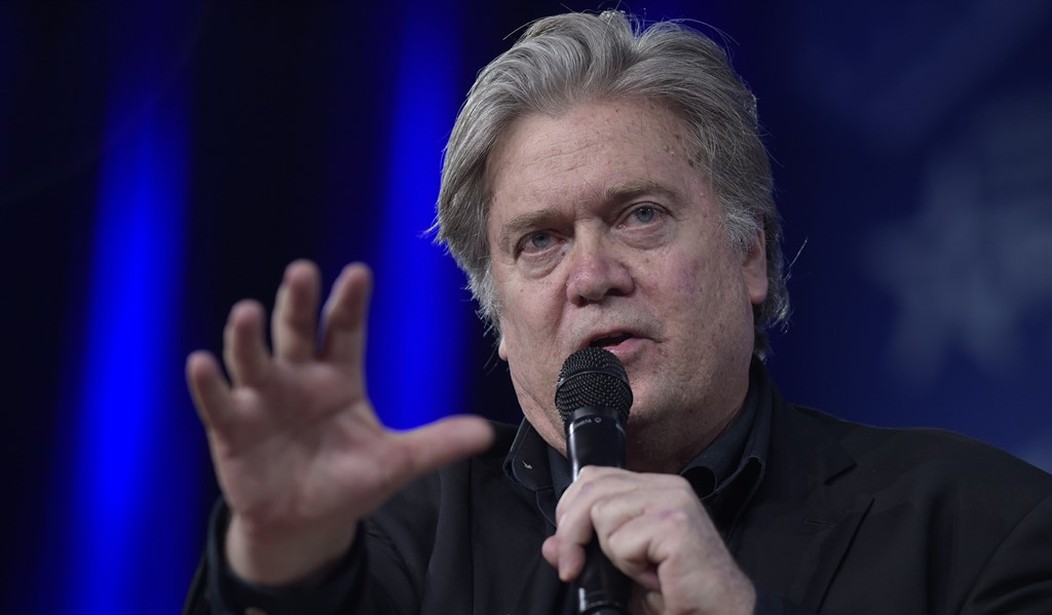A companion piece to Andrew’s post this morning about the diminishing appetite among Republicans for tax cuts unto death. The mystery in Bannon’s case is why he’s pushing this knowing that Paul Ryan’s going to vomit when he hears about it and the conservative, tax-cutting House Republicans caucus will quickly dismiss it out of hand.
Maybe that’s the point.
Steve Bannon is causing a stir inside the administration by pushing an idea that’s anathema to most Republicans: raising taxes on the wealthiest Americans to pay for steep middle and working-class tax cuts. (Some officials who’ve heard Bannon’s idea think it’s crazy, but the President’s chief strategist believes it’s a potent populist idea.)
Bannon has told colleagues he wants the top income tax bracket to “have a 4 in front of it.” (The top bracket is currently 39.6% for Americans who earn more than $418,400.)
That’s from Jonathan Swan at Axios, who’s had a pipeline to Bannon’s thoughts for months. I think it’s a smart play by Bannon in all sorts of ways, foremost by picking a fight with conservative orthodoxy on political ground that’s more favorable to Bannon’s own populist-nationalist position. The surest way to move House Republicans away from their traditional opposition to taxing and spending and towards a bigger-government vision for the GOP is to start with a populist proposal that will boost their popularity before the midterms. Taxing the rich would. Polls vary (as always), but hiking income taxes on the wealthy has lots of support among Democrats and independents and more support than you might expect among Republicans. From a Gallup poll taken last April:

A majority of Republicans disagreed that the rich are paying too little in taxes, but that majority was narrow — and other polls have found majorities of GOPers solidly in favor of raising taxes on the wealthy. A GBA Strategies survey published in January 2015 found Republicans against the idea of a 50 percent tax rate on income over $1 million … until you remind them that that was the rate initially under Reagan, in which case support shifts to 55/33. A more recent poll from PRRI released last June found 54 percent of Republicans in favor of raising taxes on people who make $250,000 a year or more, an 18-point increase since 2012. (Support among Democrats and independents was 84 and 68 percent, respectively.) The common thread between those polls, I think, is the effect of “permission” from Republican authority figures on opinions among the rank-and-file on the right. Before Trump ran for president, party orthodoxy required opposing tax hikes; remind Republicans, though, that taxes were higher during St. Ronald’s presidency and suddenly they could tolerate the idea. Likewise, with the populist Trump having secured the GOP nomination last June, average Republicans suddenly felt freer to entertain previously forbidden thoughts about class warfare against the rich. Hence the majority in favor of tax hikes.
Bannon wants to leverage that opportunity for populism by forcing a gut-check on congressional Republicans on taxing the rich. If Trump threw his weight behind the idea, if polls confirmed that it was popular even among Republican voters, if Democrats in the Senate cheered it and suddenly took an interest in compromise on tax reform, how fiercely would nervous House Republicans oppose it? It might not matter — tax hikes on the wealthy would be a mortal economic sin to Paul Ryan, who could block Trump’s bill from the floor, but Bannon’s always had it in for Ryan. He’d love to go to war with him on favorable terrain for populists. If he won, it would give Trump a boost in popularity and possibly break Ryan’s tenuous control over the caucus, reorienting dozens of Republicans towards populism. As Michael Warren says:
One possibility: Bannon is looking a little farther down the road, politically, at how the Republican party will be constituted, and who will constitute it. The more downscale voters the GOP has attracted in recent years, even before Trump’s presidency, may be less keen than Republicans of years past on keeping tax cuts for millionaires and billionaires. In this view, there’s more than a little Bernie-ism among Trump voters on whether the rich are and should pay their “fair share.”
Bannon likely believes he’s not a monster on Republican tax orthodoxy—he’s just ahead of the curve.
An added benefit for Bannon: If his populist approach to tax reform gains traction in the White House and Congress, it might chase his nemesis Gary Cohn out of the administration. Per Axios, Cohn reportedly wants a tax reform package this year and will leave the White House the instant he concludes that all hope for one is dead. What if instead he gets a tax reform package but it looks more like Steve Bannon’s wishlist than his own? If Cohn bails out, that’s one less influential “globalist” with whom Bannon has to contend for power. Seems like there are many upsides and really no downside to him in pushing this. The question is only whether Trump is willing to get behind it or if he’s content as usual to sign virtually anything Ryan and McConnell send him. Nothing would recapture the populist spirit of his campaign more quickly than soaking the rich, particularly given his own status as America’s most famous rich guy.








Join the conversation as a VIP Member